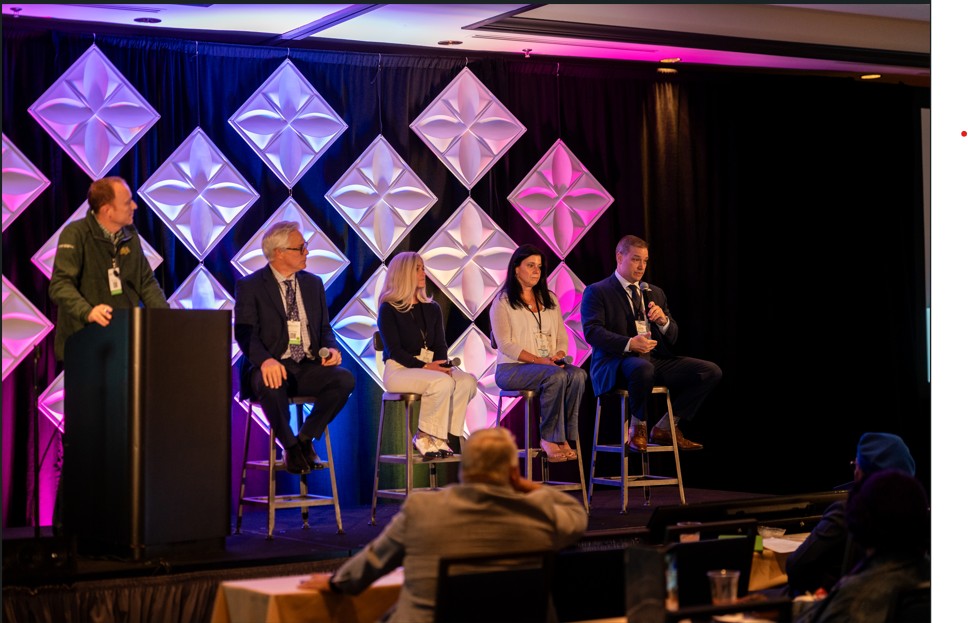This year’s AI Collaborate 2025 gathered leaders from technology, healthcare, defense, academia, and the nonprofit sector for two days of exploration into the rapidly advancing world of applied artificial intelligence. Under the theme “Smooth AI Sailing,” NLP Logix showcased how organizations are moving beyond experimentation toward building systems that learn, integrate, and scale in meaningful ways.
A New AI Imperative: Making It Matter
Keynote speaker Svetlana Makarova, Founder of Spark Change and Principal Product Leader at Mayo Clinic, challenged attendees to shift their mindset. The competitive edge in AI no longer comes from having access to advanced models, it comes from knowing how to apply them intelligently, strategically, and consistently.
Makarova outlined the Four Pillars of AI That Matters. Games, People, Leverage, and Time. Her message emphasized several priorities:
- Redesign processes rather than incrementally improving them
- Equip employees with the skills and tools needed to adapt
- Treat organizational context as a differentiator
- Build systems that compound value over time
The keynote established the tone for the event: meaningful AI transformation depends on structure, leadership, and continuous learning.
Healthcare: Where AI Drives Investigation, Acceleration, and Early Insight
AI in healthcare was a hot topic with presenters highlighting how AI has become effective in real-world use cases. Across the sessions, organizations demonstrated how AI, whether through automation, investigation-focused agents, or clinical-support tools, is driving measurable improvements without replacing human expertise.
The generative AI–focused discussions emphasized practical adoption patterns. Using AI to automate reasoning-heavy tasks, integrating AI into broader systems rather than relying on standalone models, and ensuring transparency and trust through clear reasoning trails.
Two standout real-world use cases illustrated this shift toward applied AI:
- A leading healthcare staffing agency modernized a critical credentialing platform, streamlining verification processes through workshops, event-driven architecture, and a foundation built for future AI integration.
- Mary Free Bed, a national rehabilitation provider, introduced WiggleAI, an early-screening motion-analysis tool, which identifies movement patterns associated with cerebral palsy using a hybrid cloud/device model—achieving 81% accuracy in clinical comparison and enabling earlier referrals for families.
Together, these presentations underscored how AI is already shaping the future of healthcare by improving speed, accuracy, and access while enhancing, rather than substituting, human decision-making.
Defense & Engineering: Converting Complex Manuals into Structured Intelligence
Andromeda Systems Incorporated (ASI) demonstrated how AI is transforming the enormous data challenges within defense logistics. A single military jet may require reference to 25,000+ pages, 200,000 parts, and 50–60 separate technical manuals. Manually converting these documents into Logistics Product Data has historically been slow, expensive, and inconsistent.
ASI and NLP Logix showcased their vision for a new multimodal approach that replaces brittle rule systems with OCR, vision-language models, and domain-specific model distillation. This method enables automated parsing, information extraction, and data structuring at scale
AI Assistants: Adoption as the Real Differentiator
NLP Logix unveiled its AI Assistant Enablement program, focused on bridging the gap between tool availability and actual productivity. Today, 95% of U.S. companies report using generative AI, yet 74% see no measurable outcomes.
It was emphasized that impact from AI Assistants like Microsoft Copilot 365 and ChatGPT Enterprise comes from a structured enablement, which includes:
- Training and workshops
- Measurable adoption frameworks
- Prompt packs and role-specific workflows
- Governance and safe deployment patterns
- The program’s internal rollout delivered significant results:
- Engaged users doubled within one month
- IDE chat usage increased 2.5x
- Developers reported saving roughly 1,000 hours per month using GitHub Copilot
The message was clear: AI assistants only produce value when organizations intentionally support and measure their use.
Classic ML + GenAI: A Unified Future
Ben Webster and Katie Bakewell presented a practical approach to Composite AI, combining predictive modeling, symbolic reasoning, and generative AI. Their guidance focused on matching the right method to the right task.
Two patterns stood out:
- ML-first, GenAI-as-needed for structured, high-accuracy tasks
- GenAI-first, ML-as-needed for conversational and exploratory journeys
Their roadmap underscored modular architectures, cost monitoring, and disciplined model selection as essential components of effective long-term strategy.
AI’s Evolving Impact on Work and What’s Ahead for AI Collaborate
The panels focused on Agentic AI and RPA, exploring how AI-driven systems are reshaping work across industries, with experts from sectors such as healthcare and staffing sharing real-world insights and impacts. Overall, AI Collaborate 2025 proved to be a strong success, bringing together leaders and innovators to discuss the future of applied AI. Planning is already underway for next year, and details for the 2026 conference will be shared soon.





